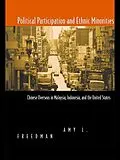From New York City's Chinatown to urban Indonesia, there are fifty-five million ethnic Chinese living outside of China. Their strong sense of community, along with their considerable economic clout, makes them a compelling group with which to study immigrant political participation. Amy Freedman's empirical study examines the hows and whys of Chinese overseas political activity in three diverse countries. When, and under what conditions, do immigrants become active in the political process? Does political influence stem from group mobilization? What role do communal organizations and their leaders play in determining participation? In answering these questions, Freedman assesses the goals and objectives of ethnic communities entering the political fray.
Autorentext
Amy L. Freedman is a Visiting Assistant Professor at Franklin and Marshall College. She received both her Ph.D. in comparative politics and international relations from New York University.
Zusammenfassung
First published in 2000. Routledge is an imprint of Taylor & Francis, an informa company.
Inhalt
1 INTRODUCTION 2 THEORETICAL APPROACHES TO UNDERSTANDING POLITICAL PARTICIPATION AND INFLUENCE 3 MALAYSIA: INSTITUTIONALIZED PARTICIPATION 4 SUHARTO'S INDONESIA: OUTSIDERS TIED TO THE PALACE 5 CHINESE IN THE UNITED STATES 6 SUBURBANIZATION: CHINESE IN MONTEREY PARK, CALIFORNIA 7 NEW YORK: THE CITY OF ETHNIC POLITICS
